Archive for the ‘MY LIBRARY’ Category.
Thursday, January 19, 2017, 8:00 am
–
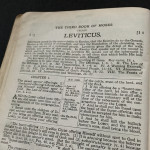
When I opened this morning’s MIQLAT Newsletter from Dr. Michael S. Heiser, I was greeted with a pleasant surprise. The newsletter is always filled with excellent material for anyone who enjoys biblical studies, but this morning I noticed a new study guide had been made available via Amazon Kindle – The Book of Leviticus.
That’s right, I said (or wrote) Leviticus and I know what you’re thinking… “Well that’s got to be a borefest to immeasurable degrees.” Actually, you’d be wrong (and wrong by more than a little).
Continue reading ‘LEVITICUS? REALLY???’ »
Category:
MY LIBRARY |
Comments Off on LEVITICUS? REALLY???
Tuesday, April 5, 2016, 9:32 am
–
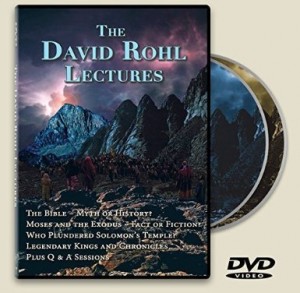
If you’re looking for a suspenseful, Indiana Jones rollercoaster type ride through the world of archaeology, this DVD series isn’t for you. It’s a lecture series. That means you’re not settling in for fast-moving documentary narrated by a spellbinding disembodied voice; you’re being given open access to a revolutionary discovery in a classroom setting. And, it’s fantastic!
If you’re looking for archaeological evidence that supports the record of biblical history, then you’ve walked down the right alleyway. By the time David Rohl finishes unpacking the groceries, your pantry shelves will be stocked as never before.
Beginning with the question of Israel’s presence in Egypt and their departure (The Exodus) Rohl walks step by step through the dynastic kings of Egypt and reconfigures the historical time period for each. It’s certainly not enough to say, “mistakes were made… believe this, not that.”
Continue reading ‘DAVID ROHL LECTURE SERIES’ »
Category:
MY LIBRARY |
Comments Off on DAVID ROHL LECTURE SERIES
Tuesday, March 22, 2016, 9:30 am
–
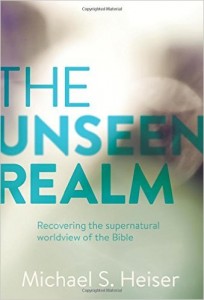 Dr. Michael S. Heiser warns, “We have a fundamental problem as Christians… as westerners, really. When we see on our screen or on a printed page the letters G, O, and D, we just mentally, we can’t help it; we just reflexively assign a specific set of unique attributes to the letters G, O, and D. And, that’s why it creeps people out to put an ‘S’ on it.”
Dr. Michael S. Heiser warns, “We have a fundamental problem as Christians… as westerners, really. When we see on our screen or on a printed page the letters G, O, and D, we just mentally, we can’t help it; we just reflexively assign a specific set of unique attributes to the letters G, O, and D. And, that’s why it creeps people out to put an ‘S’ on it.”
We hold to the doctrinal belief that there is only ONE being that’s the omniscient, all-powerful creator. And, that’s all true in Biblical theology, but that is not communicated in a single specific term in the way in which we have become accustomed to using the term. We see G, O, and D, and we automatically assign a specific set of attributes to the term, but ancient writers of the Old Testament didn’t view the terminology in our modern-day context. In his book, The Unseen Realm, Dr. Heiser methodically walks the reader step by step through an ancient Israelite’s perspective of the Old Testament text.
If your defensive shields just went on full alert, and you’re ready to click away in repugnance, then you’re in the same place that I was, Continue reading ‘THE UNSEEN REALM’ »
Category:
MY LIBRARY |
Comments Off on THE UNSEEN REALM
Tuesday, February 2, 2016, 8:34 am
–
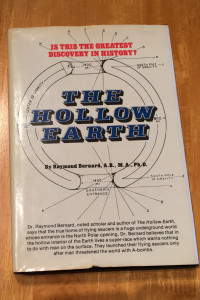 I would love to proclaim The Hollow Earth by Raymond Bernard as a fascinating read. Honestly, I would. Whether the reader buys into the premise or casually dismisses it as fanciful, the topic is one that should make for interesting reading. At least, that was the initial thought that drew me to searching out a copy of the 1979 publication.
I would love to proclaim The Hollow Earth by Raymond Bernard as a fascinating read. Honestly, I would. Whether the reader buys into the premise or casually dismisses it as fanciful, the topic is one that should make for interesting reading. At least, that was the initial thought that drew me to searching out a copy of the 1979 publication.
Starting with bold red letters on the book’s front cover, the text draws its momentum from a series of questions that never quite get answered. The book jacket asks, “Is this the greatest discovering in history?” but the 250 pages that follow never present any evidence of a discovery. Remaining questions are not only sequestered on the backside of the book jacket, but also asked time after time throughout the book (as if repetitious asking lends credence to the question itself and the supposition that is grafted to it as a response).
Questions include: Continue reading ‘THE HOLLOW EARTH’ »
Category:
MY LIBRARY |
Comments Off on THE HOLLOW EARTH
Sunday, December 20, 2015, 7:26 am
–
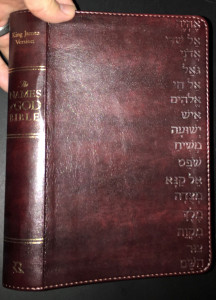 There are over 10,000 references in the scriptures to the name of God. Sometimes it is rendered as God, sometimes as Lord God, sometimes LORD (all caps), and sometimes Lord your God. In these instances and many, many more, a different name for God is being used in the original language. The Names of God Bible makes use of those original names in the original language as opposed to translating them into the customary reference.
There are over 10,000 references in the scriptures to the name of God. Sometimes it is rendered as God, sometimes as Lord God, sometimes LORD (all caps), and sometimes Lord your God. In these instances and many, many more, a different name for God is being used in the original language. The Names of God Bible makes use of those original names in the original language as opposed to translating them into the customary reference.
Names such as Elohim, Jehovah, El Shaddai, Adonai, and several others are used to identify the God of Israel in different instances to call to attention a specific aspect of God’s nature within the context. This King James Version of the scriptures leaves the original name in the text, making it easy to identify the specific context in which the name is being use.
Continue reading ‘THE NAMES OF GOD BIBLE’ »
Category:
MY LIBRARY |
Comments Off on THE NAMES OF GOD BIBLE







